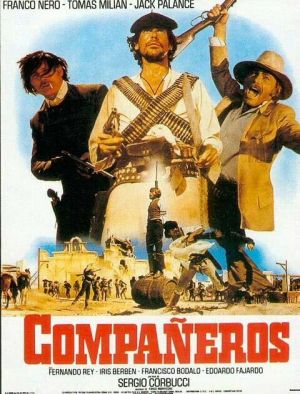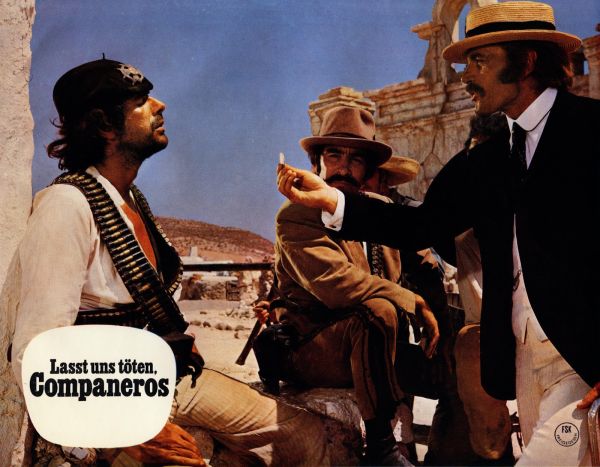Companeros film review (Varied Celluloid)
Plot Outline: Yolaf “The Swede/Penguin” Peterson (Franco Nero) is a new face in Mexico and he has plans to make a quick buck. He inevitably meets up with Mongo, a guerilla general in the Mexican Revolution, and the two find a common interest. Yolaf has weapons and Mongo wants weapons, but there is a problem. The only money in town is locked away in a safe in the bank. Yolaf takes a look at the safe and quickly concludes that the only way to open it is to find out the combination. This is a big problem, because Mongo killed the only local civilian who knew the combination. The only other person who knew the combination was Professor Xantos, who happens to be held in prison by the Americans. Yolaf, being the nice fella that he is, offers his services in retrieving the professor. Mongo agrees, but sends Vasco (Tomas Milian) along with him. Vasco, who has already shown his disdain toward The Swede by trying to kill him, agrees reluctantly. Now, Peterson and Vasco set out for Texas, but they soon run into all sorts of trouble with the US army, as well as a strange man named John (Jack Palance) who lost his hand because of our Swedish friend.
The Review
Your loyal webmaster ‘il Joshua’ is having a bit of a spaghetti western revival this week. This here is the first entree from my all-spaghetti diet, and I can’t imagine starting out with a better film. After loving Sergio Corbucci’s classic Django, and hearing people label him the second most talented spaghetti western director out there (aside from Sergio Leone), I made a point to search out more films by him. Compañeros stood out as a perfect choice. After watching it, I feel the need to search out even MORE of his films, because it really is that great. If I had reservations about Franco Nero’s ability to play a tough guy while watching Django (can you really blame me with the terrible voice actor he was given?), they were all washed away by his role in this film. In Compañeros, he doesn’t exactly play a anti-hero in the same sense as he did in Django, but never the less he does come across as being just as superhuman. His Swedish accent doesn’t exactly scream ‘tough guy,’ but at least the voice and the character work together this time. The film would likely be considered a guilty pleasure if we were talking about serious films here, but we are not and these are Italian westerns, so leniency is given in abundance. There are certainly a number of flaws to be found in Compañeros, but at the end of the day it’s just another pulp western from the seventies that fulfills it’s ultimate goal of providing entertainment. There’s something noble about that when you look at the pretentious crap that is out there these day.
I might as well get the bad stuff out of the way first. Compañeros is the kind of film that has a million small and grating little annoyances, but has four or five great aspects to it that help to ease out any displeasure for the film. What really almost drops Compañeros from being great is a simple and common problem: it’s just too scattered. Characters motives are so muddled throughout that audiences almost have to hit rewind to remember exactly how these characters got into their current predicaments. The characters, other than being interesting on the outside, barely have anything resembling depth. Vasco is about as close as it comes to being a character who changes and grows with the story, but even his metamorphosis is muddy. When he becomes a devoted follower of Xantos, there’s never really much explanation given. There aren’t enough scenes showing Vasco listening to what Xantos has to say, or scenes showing his appreciation for his words. It seems as if in one scene he’s a pompous doughboy, but in the next a ‘real’ revolutionary. At least Franco Nero’s character is consistent throughout the film with his ambivalence over which side to take. The second thing that didn’t exactly float with me was the tacked-on political undertones. I like the fact that the movie doesn’t really choose sides and remained ambiguous, but the fact that it didn’t choose sides and only offered mild criticisms of capitalism, communism, etc. only makes me wonder why it was so sloppily added. The Americans are shown as greedy oil hungry fools, and the revolutionaries are shown as greedy marxist schmucks, while Professor Xantos is shown (at least in my eyes) as a disillusioned fool. If you’re not going to get any deeper than that, there’s really no use in saying anything at all.
Still, those are the two big problems I had with the film, but for those two things, as well as their tiny accompanied criticisms, the film has a hundred other saving graces. The acting, for what it is, is great. Franco Nero bring a great amount of exuberant energy to his role, even if his blonde mustache just looks silly. Tomas Milian was also a real surprise. His character could be compared to Toshiro Mifune’s role in Seven Samurai, a brash and arrogant young man who thinks he knows everything, but he could also simply be a jerk who always seems to have a a smart-alek comment. The role doesn’t exactly call for him to focus his craft, but it did show he was truly leading man material. He’s charismatic, he’s cool, and he rules the screen. I can’t wait to watch The Big Gundown and Django… Kill!, both of which I actually have lying here in front of me but haven’t watched as of yet. The only other actor anyone need worry themselves over is Jack Palance, who in his role as ‘John,’ was extremely underused. I read a review (I believe at the unknown movies page) that complained that his scenes dragged the film down, but I felt just the opposite. There are plenty of scenes throughout the film that cause the pace to crawl, but Palance’s scenes were gold. His character is utterly hilarious, and I’m not sure if he was supposed to be serious or not, but Palance chews scenery like you wouldn’t believe. He plays it so over-the-top and out-of-touch with reality, that he had me laughing out loud during his every appearance. His character seems like a separate entity within the film, like if someone took all b-movie villain cliché’s and threw them in a pile, then let them fester for a week or two. That’s what his character is, the smoldering remains of every evil cinematic villain the world has seen. There are at least two scenes, count them TWO, where he and his men set up elaborate death traps, only to leave those he wishes to die completely alone and out of sight. He’s almost like Dr. Evil from Austin Powers, if only those movies were funny (zing!). My memory of the film is fading, but Palance’s performance ranks as one of the highest things I can recommend about it.
I’m running short of space now (actually, no I’m not, I could add another paragraph other than my usual four, but I don’t feel like it because I’m lazy), but I might as well get the other really cool aspects of the film out of the way. The direction of the film is great, Corbucci is just as technical as he was on Django, but more light-hearted and fun with his story. The cinematography is fantastic, pristine images and beautiful landscapes paint the landscape rather than the tired and drive-out look of the west that was so common in these films. The action in the film is a major selling point for me. The final battle definitely should get a lot of attention, but there are other small moments that can blow audiences away. The first time Nero grabs a gatling gun, I could not stop laughing, but the second time he grabbed one, I nearly soiled myself. Last, but most certainly not least, there is the score. The maestro, Mr. Ennio Morricone, provides one of his most catchy film scores in this film. When I first heard it, I won’t lie, I didn’t think much of it. The first thing that hit my brain was ‘Morricone by the numbers,’ because it seemed so familiar, but by the end of the film I was singing along to it even though I didn’t know the words. Similar to David Spaid and Chris Farley in Tommy Boy, I found myself half-humming and half-singing. After watching the film, I’m sure you will as well. “La, la, la, la, compañeeeeeros, la, la, la, la, la, compa-ñer-oooooos.”
by Josh Samford, originally published June 22, 2008





